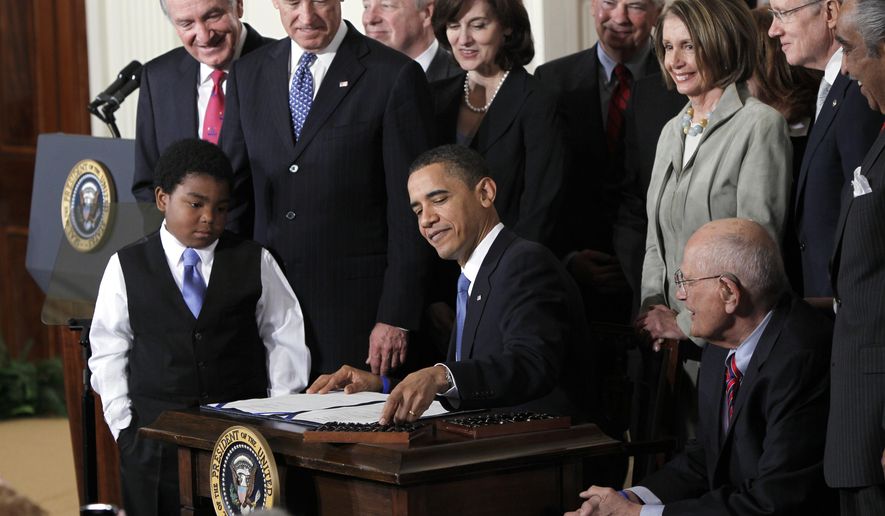The Obama administration’s controversial climate change agenda is being driven largely by outside forces in the environmental community, and powerful activist groups have played a major — and perhaps illegal — role in crafting key Environmental Protection Agency policies, a detailed report released Thursday charges.
Emails obtained by the Energy and Environment Legal Institute (EELI), an environmental policy watchdog and frequent critic of the EPA, show that powerful environmental groups such as the Sierra Club, the Natural Resources Defense Council and others engaged in secret discussions with top administration officials. Much of the EPA’s climate agenda, including its looming regulations limiting carbon emissions from coal-fired power plants, is being crafted by those outside groups, the report says.
The apparent collusion has attracted the attention of powerful lawmakers on Capitol Hill, who are ramping up efforts to track down correspondence between EPA officials and environmental activists. Sources on the House Science, Space and Technology Committee, for example, say they’re still waiting for the EPA and Energy Department to provide emails and other records related to the administration’s work with outside environmental groups.
EELI points to electronic conversations via nongovernment email accounts and secret meetings between EPA officials and environmental activists, sometimes held at Washington coffee shops to skirt official EPA headquarters visitor logs.
The bombshell report comes just days before the EPA is set to release its new carbon emissions restrictions, known as the Clean Power Plan. The regulations, designed explicitly to reduce carbon emissions and reduce coal’s share of U.S. power generation, could be unveiled as soon as Monday. The plan forms the centerpiece of Mr. Obama’s broader climate agenda and his pledge to the international community that the U.S. will cut overall greenhouse gas emissions by at least 26 percent by 2025.
But EELI and other critics argue the Clean Power Plan, along with other environmental policies of this administration, should be tossed out and that the agency should start from scratch, free from all interference from outside activists.
“EPA’s [greenhouse gas] rules are the product of unlawful collusion and are themselves therefore unlawful. Congress, the courts — or EPA, in a moment of rationality — should stop these rules from taking effect. Otherwise the (intended) anticipatory harms of this sham rule making will be imposed upon millions of Americans causing years of damage before the ultimately illegal agency rulemaking is overturned,” EELI’s report reads in part. “The tide must be turned on EPA’s collusive actions.”
The report also says environmental activists worked closely with the EPA to block the proposed Pebble Mine in Alaska. A federal judge last month rejected the EPA’s request to toss lawsuits from Pebble Limited Partnership, the mining company proposing the project. The company’s suits now are moving forward, charging that the EPA violated transparency requirements and demonstrated a clear bias against the project.
Claims that the EPA works far too closely with outside environmental activists are nothing new. EELI, Republican lawmakers on Capitol Hill and other critics long have argued that many EPA policies, including the Clean Power Plan, represent government implementation of environmental activists’ priorities.
The agency vehemently denies any wrongdoing.
In a brief statement Thursday, the EPA pointed to the fact that the Supreme Court, along with several lower courts, have upheld the agency’s authority to regulate carbon emissions from power plants under the Federal Clean Air Act.
“The Clean Power Plan follows our clear legal authority under the Clean Air Act. The supreme court [sic] has decided multiple times that EPA has an obligation to regulate greenhouse gases,” EPA spokesperson Melissa Harrison said in a statement. She did not address specific claims of collusion laid out in the EELI report.
The EELI research comes against the backdrop of previous revelations that former EPA Administrator Lisa Jackson used unofficial means — including a private email account with the name “Richard Windsor” — to conduct official government business.
The report lays out several specific instances of similar activity and names several administration officials EELI alleges have led the way in working with outside environmental activists.
Perhaps the most dramatic example centers on former EPA official Michael Goo, a former top official in the EPA’s Office of Policy who now serves as counsel to House Energy and Commerce Committee Democrats.
Mr. Goo previously worked for the Natural Resources Defense Council, a powerful environmental group and staunch supporter of the Clean Power Plan and other pieces of Mr. Obama’s climate agenda.
The report cites obtained emails and other information showing that Mr. Goo remained in close contact with former colleagues in the environmental movement as EPA crafted controversial climate policies. EELI also says Mr. Goo used private Yahoo email accounts for such correspondence, and that he met with top Sierra Club activists at a Starbucks across the street from EPA’s Washington headquarters.
Hosting environmental activists inside the EPA complex would’ve required them to sign visitor logs.
“His collusion with Sierra Club, at minimum, has led EPA to circumvent the ordinary process of public notice and comment, and preserving the integrity of the regulatory and otherwise the federal record,” the report says.
Rep. Lamar Smith, chairman of the House Science, Space and Technology Committee, has called Mr. Goo’s interactions with outside groups “troubling.” The committee also has obtained emails detailing the close contact of Mr. Goo and his former colleagues in the environmental movement.
“Mr. Goo’s actions are troubling because it creates the appearance of secrecy,” Mr. Smith wrote in a May letter to EPA Administrator Gina McCarthy. “For two years, his communications with the Sierra Club and other outside groups were hidden from Congressional inquiries and Freedom of Information Act (FOIA) requests — potentially violating the Federal Records Act.”
The Sierra Club and the Natural Resources Defense Council did not respond to requests for comment.
• Ben Wolfgang can be reached at bwolfgang@washingtontimes.com.




Please read our comment policy before commenting.